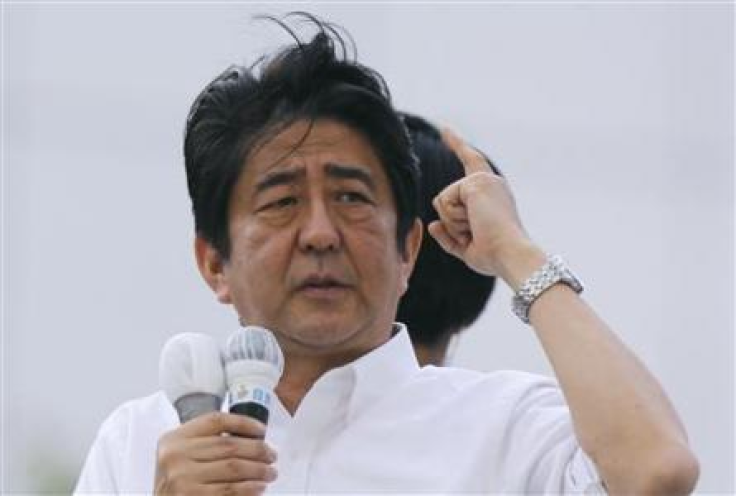Abe's Coalition Wins Big In Japan

Prime Minister Shinzo Abe's ruling bloc won a convincing victory in the upper house election Sunday, solidifying his hold on power and establishing Japan's first stable government in years.
According to the exit polls reported by the Asahi Shimbun, Abe’s Liberal Democratic Party is expected to pick up 62 seats, while junior coalition partner New Komeito was expected to win 10 seats. The two parties only needed to win at least 63 seats combined to gain a majority in the 242-seat House of Councilors and control both Diet chambers.
Although the LDP did not appear to be winning the 72 seats that would give it a clear majority by itself in the Upper House, it was expected to win between 61 and 69 seats, while New Komeito was likely to win between 10 and 13 seats. The opposition Democratic Party of Japan was heading toward another disastrous result, with exit polls showing the party may not even win 20 seats, less than half of the number that it had that were being contested.
The victory gives the hawkish leader a stronger mandate for his "Abenomics" recipe to revive the economy, but it also raises questions over whether he will shift his focus to his nationalist agenda, or be able to keep his party in line to push through structural reforms many say are vital for growth.
The win spells a personal vindication for Abe, who led his LDP to a humiliating defeat in a 2007 upper house poll during his first term as premier, Reuters noted.
The ensuing parliamentary deadlock allowed the opposition to block legislation and led to Abe's resignation two months later. He was followed by a string of revolving-door leaders.
"People wanted politics that can make decisions and an administration with a stable grounding, which led to today's result," LDP Vice President Masahiko Komura told public broadcaster NHK.
"'Abenomics' is proceeding smoothly and people want us to ensure the benefits reach them too. That feeling was strong."
Abe, 58, who returned to power after a big win in December's lower house poll for his LDP and New Komeito, has said he will remain focused on fixing the economy with a mix of loose, inflationary monetary policy, fiscal spending and a growth strategy including structural reforms. LDP leaders repeated that pledge on Sunday as the votes were being counted.
"What the public is demanding the most is to solidify the trend of economic recovery," said LDP Secretary-General Shigeru Ishiba.
Final results will be known late on Sunday or early on Monday.
No election for either house of parliament need be held until 2016.
The LDP and two smaller parties that back Abe's drive to revise Japan's pacifist constitution to legitimize the military looked to fall short of the two-thirds majority needed to take revisions of the charter to a public referendum, the exit polls showed. Those parties have two-thirds of the lower house seats.
© Copyright IBTimes 2024. All rights reserved.











